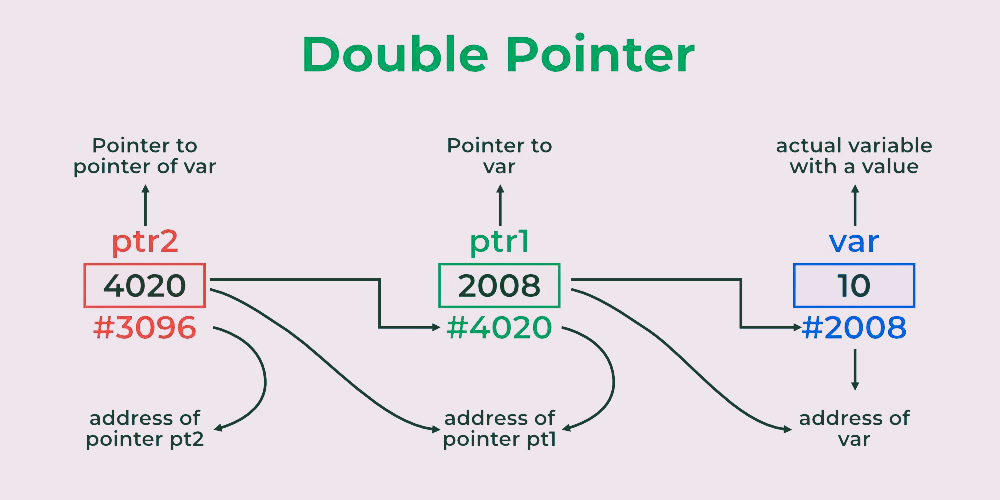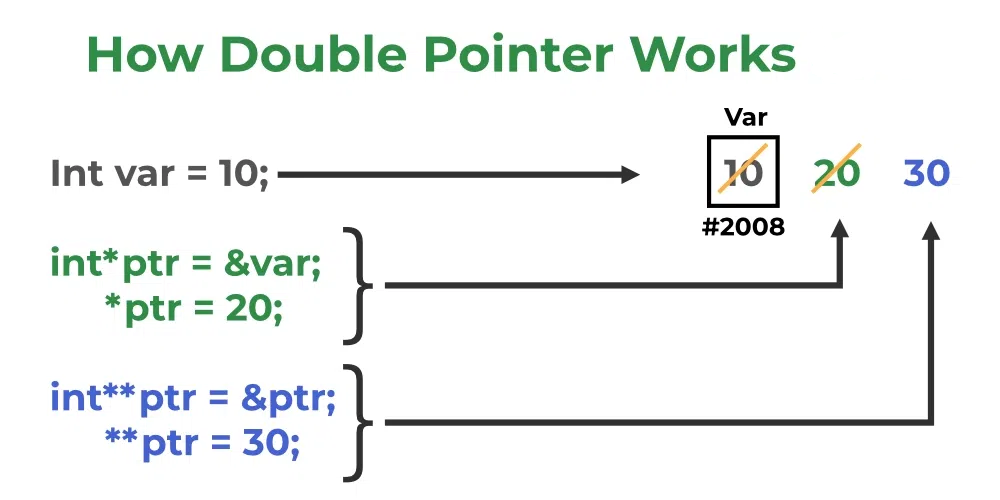Definition
- A double pointer is a pointer that holds the memory address of another pointer.
- In other words, it's a pointer to a pointer, allowing indirect access to a memory location where another pointer is stored.
It is denoted by two asterisks (**).

Syntax:
Declaring a double pointer involves using two asterisks (**) before the variable name.
Example:
int** p_to_p;Working of Double Pointer
Suppose we have the following code snippet:
int main() {
int x = 42; // Create an integer variable
int* p = &x; // Create a pointer and assign the address of x to it
int** pp = &p; // Create a double pointer and assign the address of p to it
// Print the value of x using double pointer
std::cout << "Value of x using double pointer: " << **pp << std::endl;
return 0;
}
Explanation of each step:
- Declaration:
- We declare a double pointer pp using the syntax int** pp;, indicating that pp is a pointer to a pointer to an integer.
- Initialization:
- We initialize the double pointer pp by assigning the address of the pointer p to it using the syntax int** pp = &p;. Now, pp holds the memory address of p.
- Dereferencing:
- To access the value of x using the double pointer pp, we use the dereference operator (*) twice: **pp.
- The first dereference (*pp) retrieves the address of the pointer p.
- The second dereference (**pp) retrieves the value stored at the address pointed to by p, which is the value of x.
- Output:
- We print the value of x using the double pointer: std::cout << "Value of x using double pointer: " << **pp << std::endl;.

Size of Pointer to Pointer
The size of a pointer to a pointer (double pointer) in C/C++ is the same as the size of a normal pointer. This is because a pointer to a pointer stores the memory address of another pointer, and the memory address itself is of fixed size, irrespective of the type of data it points to.
Here's a simple program to verify this:
#include <stdio.h>
int main() {
int* p;
int** pp;
printf("Size of int* (pointer): %lu bytes\n", sizeof(p));
printf("Size of int** (double pointer): %lu bytes\n", sizeof(pp));
return 0;
}
// Output
Size of int* (pointer): 8 bytes
Size of int** (double pointer): 8 bytesComplete Example:
#include <iostream>
using namespace std;
int main() {
int x = 07; // Create an integer variable
int* p = &x; // Create a pointer and assign the address of x to it
int** pp = &p; // Create a double pointer and assign the address of p to it
cout << "address of x: " << &x << endl;
cout << "address of x: stored in p " << p << endl;
cout << "address of x: stored in double p " << *pp << endl;
cout << "Printing Value Now"<< endl;
cout << "value of x: " << x << endl;
cout << "value of x: by pointer p " << *p << endl;
cout << "value of x: by double-pointer pp " << **pp << endl;
return 0;
}
// Output
address of x: 0x7ffdfea609a4
address of x: stored in p 0x7ffdfea609a4
address of x: stored in double p 0x7ffdfea609a4
Printing Value Now
value of x: 7
value of x: by pointer p 7
value of x: by double-pointer pp 7
Leave a comment
Your email address will not be published. Required fields are marked *
